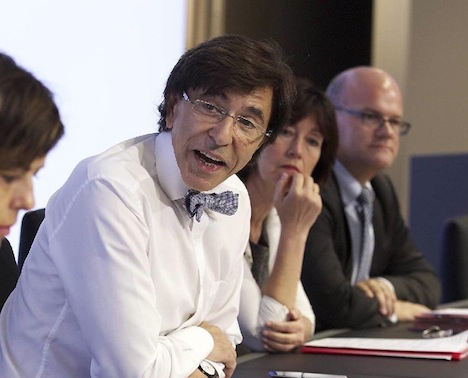8. Belgium parliamentary election, May 25.![]()
Pity Belgian prime minister Elio Di Rupo — despite the fact that Belgians last voted in June 2010, the ensuing coalition talks meant that Di Rupo (pictured above) only became prime minister in December 2011. Just two years later, Belgium is already looking ahead to elections in May, and coalition talks could once again stretch in terms of years, not days or months.
While the agreement that installed the Di Rupo government enacted to a set of political reforms that ended direct elections for the upper house of the Belgian parliament, Belgians will determine all 150 members of the Chamber of Deputies (Kamer van Volksvertegenwoordigers in Flemish, Chambre des Représentants in French). With 88 seats up for grabs in the Dutch/Flemish-speaking northern region of Flanders and 62 seats in the French-speaking southern region of Wallonia, the linguistic and regional divide virtually guarantees that no single party can come close to winning an outright majority.
Polls show that the parties have roughly the same amount of support as in 2010.
That means that Di Rupo’s leftist Parti Socialiste (PS, Socialist Party) is likely to emerge as the largest Francophone party. But it’s followed closely by the liberal Mouvement Réformateur (RF, Reformist Movement). The Christian democratic Centre démocrate humaniste (cdH, Christian Humanist Center) and Ecolo, Belgium’s Francophone green party, should also win a significant number of seats.
But on the Flemish side, Antwerp mayor Bart de Wever’s Nieuw-Vlaamse Alliantie (N-VA, New Flemish Alliance), which has called for the gradual secession of Flanders from Belgium, seems set to improve on its 2010 total. The N-VA emerged as the party with the largest number of seats after 2010 (with 27 to 26 for Di Rupo’s Socialists), and it could emerge as the largest party by an even wider margin in 2014. Its chief competition is the more conventional Christen-Democratisch en Vlaams (CD&V Christian Democratic and Flemish), which leads the regional Flanders government. Other parties include the social democratic Socialistische Partij Anders (sp.a, Socialist Party Different), the liberal Open Vlaamse Liberalen en Democraten (Open VLD, Open Flemish Liberals and Democrats), the far-right, pro-independence Vlaams Belang (VB, Flemish Interest, VB) and the Groen, the Flemish Greens.
The current government brings together the top three Francophone parties (socialist, liberal and Christian democratic), the Flemish Christian Democrats and the Open VLD, leaving the most pro-independence Flemish parties and the two green parties in opposition. With the federal election scheduled for the same day as elections to the European Parliament, it could maximize turnout among the euroskeptic and the Flemish secessionist electorate, which could leave de Wever and the N-VA in a much stronger position over the next five years.
